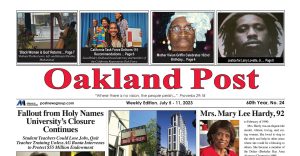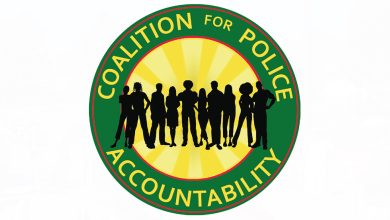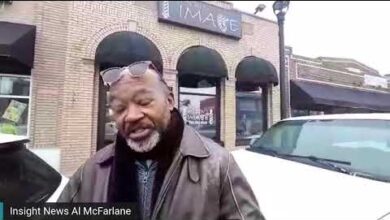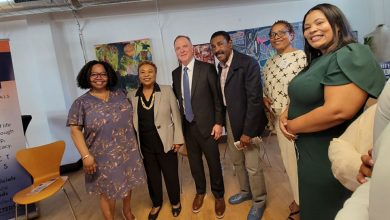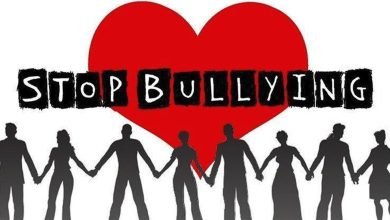COMMENTARY: A New Verse of “We Shall Overcome” in Civil Rights 2.0
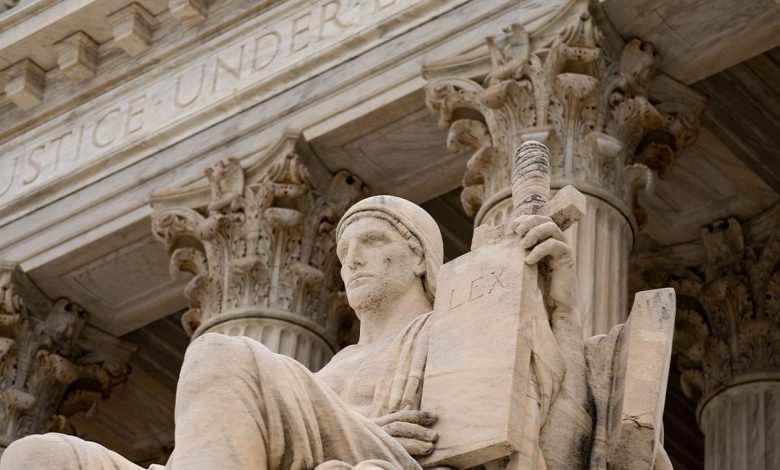
By Emil Guillermo
If you felt more vulnerable this July Fourth, you weren’t imagining things. You had more rights last week than you did on America’s birthday.
That’s thanks to the black robes of SCOTUS.
With a series of 6-3 opinions, the U.S. Supreme Court showed how far the conservative court will go to protect a dwindling white majority.
Pretty far.
Want a website for your gay wedding? No business open to the public can be forced to do one for you. In fact, any business can now legally discriminate and exclude you, if they can show it’s a matter of their free speech versus your public accommodation. The court ruled bigoted free speech wins.
Then there’s help on student loan debt. Sorry, you have to pay up. Unless you’re like a bank that passed out bad mortgages in 2008, no one’s bailing you out.
And if you were a person of color qualified to go to an Ivy league school, the laws that might have helped last week, no longer apply. And please don’t tell us what color you are. The court has told schools to be colorblind and indifferent to race.
Justice got a little harder to achieve if you aren’t white, straight, and rich.
That’s the takeaway after the high court’s grand finale. With all the news the court’s been making on its lack of ethics involving tens of thousands of dollars from billionaire right-wing donors, the current SCOTUS has proven to be more venal, human, and political than any of us could have imagined.
It’s not the elevated dispassionate body thought to rule with a sense of high-minded legal scholarship and a healthy respect for precedent.
No, the court is right there in the swamp with everything else in DC, a SCOTUS forged by politics and bias.
And if you don’t vote, it’s the court we deserve.
Want a better SCOTUS? You’ve got to register and vote.
Now, after 50 years of progress moving toward a more just society, America has a 6-3 rollback court that we should have seen coming. It started last June with Dobbs v. Jackson and the reversal on abortion.
And now it’s unsettling other aspects of our settled lives.
They’re making us go down the mountain and climb back up, singing “We shall overcome” all over again.
Don’t Blame Asian Americans
On the big issue of affirmative action, we all need to be clear. The case of Students for Fair Admissions (SFFA) v. Harvard University was not a victory for Asian Americans.
Despite the plaintiffs being Asian Americans in this case, most Asian Americans in this country were in favor of affirmative action.
If you want to point fingers, make sure you’ve got it pointing to the man who founded SFFA, and remains its leader. He’s not an Asian American, it’s the white man wearing the horned crown, Edward Blum.
Blum (rhymes with fume) is a non-lawyer, but a persistent anti-civil rights activist funded by the right wing, whose life is committed to filing lawsuit after lawsuit to undo the last 50 years. He’s made a career of neutering the Voting Rights Act and affirmative action.
Blum brought another case, Fisher v. University of Texas, before the high court in 2016 but lost. His error was using a white, female plaintiff to front the lawsuit. This time he found Asians rejected from Harvard and used them as his ‘yellow face’ to pit Asians (Blum) vs. Blacks and Latinix. And it worked.
Chief Justice John Robert’s opinion was just wrong, beginning with his application of the Equal Protection Clause of the 14th Amendment to strike down the use of race.
“The Harvard and UNC admissions programs cannot be reconciled with the guarantees of the Equal Protection Clause,” wrote Roberts. “Both programs lack sufficiently focused and measurable objectives warranting the use of race, unavoidably employ race in a negative manner, involve racial stereotyping, and lack meaningful end points.
End points? Do you mean the meter’s running on justice and fairness and at some point racists just need to run out the clock?
The use of the Equal Protection Clause got the attention of Neal Katyal, former acting Solicitor General of the United States, who said that the Equal Protection Clause only binds state actors and not private institutions like Harvard.
So, can Harvard, a private institution, violate the Equal Protection Clause?
“Legally, that’s just impossible,” said Katyal, a law school professor of more than 20 years in an interview on MSNBC. By virtue of taking federal funds Harvard could be in violation of Title VI, a federal statute, Katyal said. “But Harvard certainly didn’t violate the Constitution.”
At least Roberts didn’t formally overturn existing laws. He just removed a key single piece from the equation — race.
But Roberts did allow for a loophole:
“Nothing in this opinion should be construed as prohibiting universities from considering an applicant’s discussion of how race affected his or her life, be it through discrimination, inspiration or otherwise,” Roberts wrote. “In other words, the student must be treated based on his or her experiences as an individual — not on the basis of race.”
Well of course, for one, that would be a First Amendment issue and Roberts didn’t want to mess with that.
Justice Sotomayor said it was like “putting lipstick on a pig.” But the fact is, if you want to go to Harvard, tell your story. That hasn’t changed in 50 years.
That’s how I got in.
The Power of Affirmative Action
Frankly, the ruling made me feel a little guilty. Could I have done something to save affirmative action — more than 50 years ago?
Chief Justice John Roberts was at Harvard the same time I was there. He was just a kid and robeless back in the ’70s. But my mere presence at “that school in Boston” did not persuade young Roberts of the merits of diversity or the mutual benefits of having an underprivileged Filipino kid as part of the student body.
Because I was not just there to take. I was there to give — to America’s future leaders, like Roberts, a real world understanding beyond white preppie-dom, and to help him build the kind of empathy he’d need to have as a chief justice of the United States.
Had I succeeded — had our paths crossed — maybe Roberts would not have written such a terrible opinion that set back progress in higher education nearly 50 years.
SCOTUS just forced our hand. But there are more of us now. And we’re diverse.
Get ready for Civil Rights 2.0.
Emil Guillermo is a journalist and commentator. His “Emil Amok” monologues are on YouTube and on www.amok.com.
